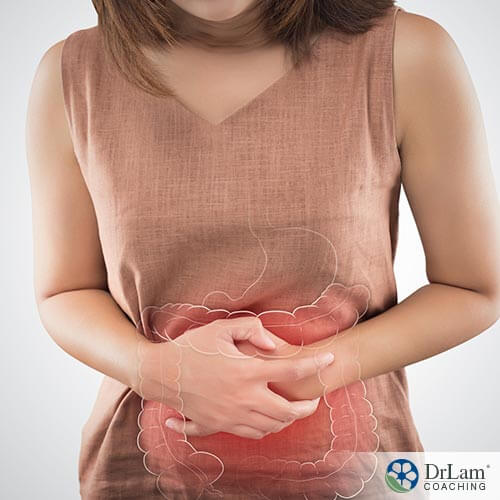Irritable Bowel Syndrome (IBS) can be debilitating, embarrassing, and severely affects your quality of life. Although stress and diet are recognized as major contributing factors to IBS, scientists have yet to determine the exact cause of the problem. Recent studies suggest reducing IBS with vitamin D may be possible as an effective method of dealing with the condition. The symptoms of IBS can vary greatly from person to person. Therefore, understanding more about this frustrating condition and its associated symptoms may help to successfully address the problem.
 Irritable Bowel Syndrome is a chronic debilitating gastrointestinal disorder and may also be referred to as spastic colon, irritable colon, mucous colitis, or spastic colitis. But should not be confused with inflammatory bowel disease (IBD), which is a much more serious and complicated condition. Though IBS does not pose a serious threat of gastrointestinal cancer, the condition may affect your quality of life.
Irritable Bowel Syndrome is a chronic debilitating gastrointestinal disorder and may also be referred to as spastic colon, irritable colon, mucous colitis, or spastic colitis. But should not be confused with inflammatory bowel disease (IBD), which is a much more serious and complicated condition. Though IBS does not pose a serious threat of gastrointestinal cancer, the condition may affect your quality of life.
Sufferers of IBS may experience only one or many of the symptoms, and the severity and duration of symptoms largely differs from person to person. However, the main symptom that all sufferers experience is chronic intestinal discomfort.
Other symptoms associated with IBS include:
IBS sufferers may also experience additional non-intestinal-related symptoms such as:
Lower abdominal pain is the most prevalent symptom of IBS, the severity of which is usually reduced after bowel movements. Diarrhea can cause frequent and sudden urges for bowel movements, which are often hard to control. This is reported to be one of the main reasons IBS sufferers often avoid social gatherings.
Scientists have found very little evidence of what actually causes IBS, but diet and stress are known to be major contributing factors. Other factors including GI infections, nausea, anxiety, depression, antibiotics, and low immunity. Certain medications are also known to trigger IBS symptoms. Many people find the condition embarrassing thus preventing them from seeking a diagnosis. The good news is that recent scientific studies suggest reducing IBS with vitamin D may be possible. This new finding could prove extremely helpful, particularly for those who choose to live with the condition in silence.
A study performed by the Molecular Gastroenterology Research Group at the University of Sheffield recently revealed that in a batch of over 51 patients with IBS, up to 82 percent had low vitamin D levels. Another study published in the European Journal of Clinical Nutrition showed that the majority of IBS sufferers are vitamin D deficient. During the study, researchers discovered that a daily dose of vitamin D was enough to significantly improve the painful symptoms of IBS such as diarrhea, constipation, bloating, and gas.
Scientists believe further research is required before vitamin D can be regularly prescribed for normalizing IBS symptoms. However, the study definitely suggests IBS sufferers should have their vitamin D levels tested.
The stress exerted on your body as a result of IBS can leave you feeling fatigued. The NeuroEndoMetabolic (NEM) Stress response system is your body’s natural stress-fighting mechanism comprised of various organs and six circuits working in close coordination to help your body deal with stress. The pair of walnut-shaped adrenal glands located above your kidneys are vital components of this stress response system.
Inflammation is an important part of your immune response and helps fight against harmful pathogens, protects you from infections, and assists in the healing process after injury. However, in certain cases, an inflammatory response can be triggered in the absence of infection or injury and may actually begin to damage to the healthy cells of your body. With time, this type of inflammation may become chronic and lead to various health problems that exert additional stress on your body and leave you feeling fatigued.
During stressful situations, your NEM system signals to the adrenals prompting them to secrete the anti-stress hormone cortisol. Consistently high levels of stress can overburden your adrenal glands and eventually cortisol production decreases. This reduces your body’s capacity to manage stress and increases your chances of developing Adrenal Fatigue Syndrome (AFS).
If you frequently experience extreme fatigue along with other symptoms including brain fog, low concentration levels, anxiety, constipation, low energy levels, insomnia, difficulty waking up, stubborn weight gain, and cravings for salty or fatty foods, chances are high you may be suffering from Adrenal Fatigue. When your stress levels exceed your body’s natural ability to handle stress, this can lead to Adrenal Fatigue. If you’re already suffering from AFS, you’ll need to minimize your exposure to stress in order to make a successful recovery.
The gastrointestinal tract is adversely affected by IBS thus causing an imbalance of your inflammation circuit. This affects your microbiome and immune system, both important components of the inflammation circuit. Since the NEM system is an intricate network of various organs and circuits working in unison, dysfunction in any of your organs affects the entire NEM system. The chronic gastrointestinal discomfort caused by IBS exerts stress on your body and can therefore trigger AFS symptoms.
 If you suffer from both IBS and Adrenal Fatigue, the situation is more challenging. Those suffering from Adrenal fatigue are already weak, therefore, a more holistic approach is needed to normalize IBS since the side effects of over-the-counter medication may tax your overburdened adrenals and worsen your AFS symptoms. Since the link between IBS and vitamin D deficiency has now been reported, reducing IBS with vitamin D should be considered as a safe and effective method. Especially since conventional medicines cause additional side effects that can leave your body even more stressed.
If you suffer from both IBS and Adrenal Fatigue, the situation is more challenging. Those suffering from Adrenal fatigue are already weak, therefore, a more holistic approach is needed to normalize IBS since the side effects of over-the-counter medication may tax your overburdened adrenals and worsen your AFS symptoms. Since the link between IBS and vitamin D deficiency has now been reported, reducing IBS with vitamin D should be considered as a safe and effective method. Especially since conventional medicines cause additional side effects that can leave your body even more stressed.
Vitamin D is essential for your body and may help alleviate IBS symptoms as well as Adrenal Fatigue, moreover, a deficiency can lead to hair loss, muscle pain, fatigue, diabetes, depression, obesity, osteoporosis, and delayed wound healing. Further, those with a Vitamin D deficiency are at a higher risk of developing colorectal cancer, IBD, and IBS.
For reducing IBS with vitamin D consider including vitamin D-rich foods in your diet such as mushrooms, raw milk, sardines, orange juice, almonds, and raw cheese. Sunlight is also a major source of vitamin D and may prove highly beneficial in easing your IBS symptoms. Therefore, make sure you’re getting enough exposure to sunlight—after 8 am and before 4 pm—to meet your body’s vitamin D requirements.
Vitamin D promotes healthy bones and supports your gut, musculoskeletal, and mental health. Therefore, including vitamin D-rich foods in your diet, ensuring adequate exposure to sunlight, along with maintaining healthy eating habits, doing regular exercise, properly detoxing, managing your stress levels, and taking care of any food allergies you may have, can significantly improve your IBS.
 Irritable Bowel Syndrome (IBS) is a gastrointestinal disorder which causes chronic intestinal discomfort. Additional symptoms associated with IBS include cramping, gas and bloating, diarrhea, constipation, a feeling of incomplete defecation, altered bowel movements (alternating between periods of constipation and diarrhea), abdominal pain, food intolerances, loss of appetite, and nausea. Furthermore, chronic intestinal discomfort can lead to an imbalance of your inflammation circuit, which can affect your entire NEM stress response system and increase your risk of developing Adrenal Fatigue.
Irritable Bowel Syndrome (IBS) is a gastrointestinal disorder which causes chronic intestinal discomfort. Additional symptoms associated with IBS include cramping, gas and bloating, diarrhea, constipation, a feeling of incomplete defecation, altered bowel movements (alternating between periods of constipation and diarrhea), abdominal pain, food intolerances, loss of appetite, and nausea. Furthermore, chronic intestinal discomfort can lead to an imbalance of your inflammation circuit, which can affect your entire NEM stress response system and increase your risk of developing Adrenal Fatigue.
Although the root cause of IBS remains unknown, studies have shown that most IBS sufferers are deficient in vitamin D. Therefore, reducing IBS with vitamin D may help many sufferers dealing with chronic intestinal discomfort. In addition, vitamin D has immense health benefits and can help fight fatigue. Incorporating vitamin D-rich foods into your diet, along with healthy eating habits, regular exposure to sunlight, mild body detoxes, regular exercise, taking care of food allergies, and managing your stress levels may help to successfully alleviate your IBS symptoms.
A supplement that may help address IBS and its symptoms, D5000 Plus, contains not only vitamin D, but vitamin K, calcium, and black pepper fruit extract. While many people with IBS have lower vitamin D levels, various literature suggests they also have lower vitamin K levels. IBS tends to inhibit your gut’s vitamin K production levels.
Furthermore, calcium, and the powerful antioxidant piperine in black pepper, may both help address loose stools, one of the most common symptoms of IBS.
Reducing IBS with vitamin D is considered safe and effective unless the vitamin is taken at higher doses. Vitamin D raises calcium levels in your blood which can increase the risk of your arteries hardening. If you have kidney disease, tuberculosis, lymphoma, hyperparathyroidism, sarcoidosis, or high blood calcium levels, you should be cautious when taking vitamin D and consult your doctor first.
